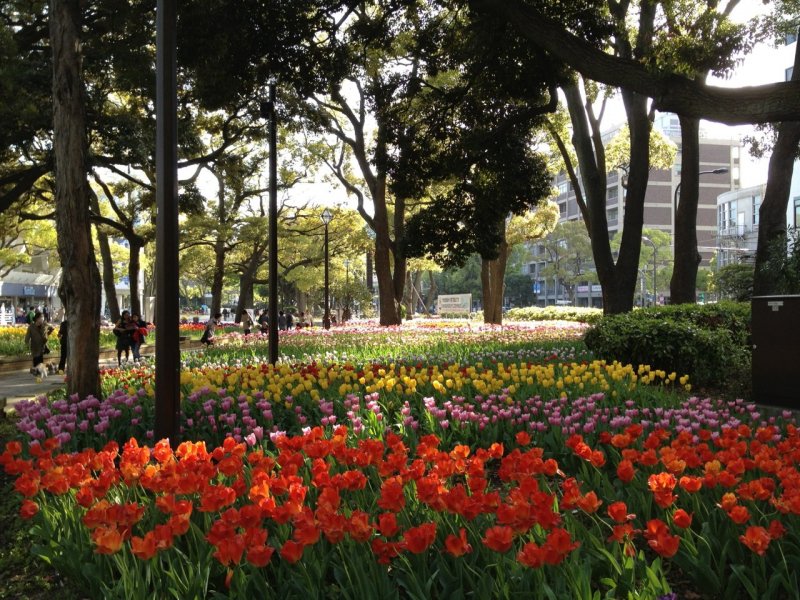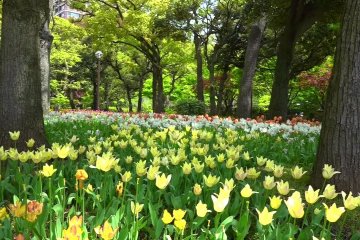
Парк и сад Йокогамы
Tomoko KamishimaПарк Йокогама, расположенный прямо напротив станции JR Каннаи, был местом отдыха и релаксации для всех в течение 137 лет.

Yokohama Park is the second oldest park in Yokohama after Yamate Park and was opened to the public in 1897. With the construction of Yokohama Stadium, the dilapidated facilities of the park were renovated and a Japanese garden-style pond and creek, a fountain and a river were renovated Multipurpose space expanded.
Around 140,000 tulips of around 70 varieties will be planted in Yokohama Park in November. The flowering time varies depending on the variety, but depending on the weather, the tulips are usually in full bloom from the beginning to the end of April. The park is a particularly popular travel destination at this time.
3-minute walk from Nihon Odori Station (Minatomirai Line)

Парк Йокогама, расположенный прямо напротив станции JR Каннаи, был местом отдыха и релаксации для всех в течение 137 лет.

Тюльпаны и легкий ветерок: В парке Йокогамы в середине апреля цветут 160 тысяч тюльпанов. Красочные тюльпаны кивают и покачиваются в такт ветерку

Yokohama Stadium is located in Naka-ku, Yokohama, and is a multi-purpose stadium. These are quite rare these days. Yokohama Stadium opened in 1978 and can seat over 30,000 people. Today the stadium...

Perfect for couples or groups (up to 12 people), Masago provides enticing kaiseki dining that is delicious and artistic. Try their classic Japanese-style cuisine that has been altered for a more international taste while retaining the harmony of its original flavors.

RUCY+R boasts a delicious and colorful vegan menu. You won't be disappointed by the Hawaiian-inspired cafe where you can try Mexican taco salad, tofu-katsu, and curry with an extra kick of veggies.

Enjoy high-quality authentic Chinese food such as dim sum, congee, and noodles at MS. CASABLANCA. This casual Chinese dining space is chic and comfortable, providing high-class Chinese dining in Kanagawa supervised by a Michelin Star chef.

Yokohama Chinatown, also known as Yokohama Chukagai, is Japan’s largest Chinatown. An enclave of Chinese shops and restaurants has stood in this section of Yokohama since the port city was opened to international trade in 1859. The entrance to Chinatown is marked by four intricate and colorful gates, which represent the four directions in Chinese tradition. Each gate is associated with a different mythological animal an additional five gates stand within the neighborhood’s boundaries. More impressive architecture can be found at the Kanteibyo temple (also known as the Guan Gong Temple), which is dedicated to the Chinese god of successful business and prosperity. Built in 1873 by the neighborhood’s residents, it remains popular among the faithful and also welcomes visitors with its serene evening lantern displays. Nearby Masobyo Temple is newer and smaller, but this Taoist temple still impresses with its decorative touches. Chinatown is noted for its cuisine, from humble street stalls to gourmet feasts. Pork or mustard green steamed buns, egg tarts and goma-dango (sesame seed dumplings) all make for popular pick-me-up streets to grab on the go. In the many eateries that line the neighborhood streets, it’s possible to dine on any number of authentic Chinese dishes – spicy mapo tofu, duck, and dozens of dim sum options are just a few of the popular menu items on offer. Several stores in the area offer a unique shopping experience not often found in other Japanese cities. Pick out the perfect good luck charm or try your luck at a fortune teller. Browse the selection of one-of-a-kind “qipao”, a type of traditional Chinese dress. Or, stock your cabinet with a range of Chinese teas. Yokohama Chukagai sees its greatest influx of visitors every winter during the fifteen-day-long Chinese New Year festivities. The neighborhood is justifiably famous for its lavish celebrations, with lion dances, parades and numerous other activities. The streets are often decked out in lanterns and paper dragons; night visits are extremely atmospheric during this season.

Kanteibyo Temple (関帝廟) is a spiritual landmark in Yokohama’s Chinatown. It shines like a beacon of faith with its vibrant red exterior and intricate detailing. Dragon statues stand above the entrance with poised bodies and open mouths, fiercely guarding the temple. The interior is decorated ornately with gold designs, wordlessly speaking of the temple’s significance. In the center sits a statue of Guan Yu, a famous military general turned deity who is immortalized in the historical Chinese novel, Romance of the Three Kingdoms. Worshippers pray to Guan Yu for business and financial prosperity. History Founded in 1862, Kanteibyo was allegedly created when a Chinese migrant brought a statue of Guan Yu to Japan. The temple started humbly as a small shrine but expanded over the years thanks to donations from devout worshippers. Kanteibyo’s history was a turbulent one, as it stood witness to numerous calamities. In 1923, the temple was destroyed by an earthquake; years later it was damaged in 1945 during World War II air raids; and in 1986, it burned down due to an unsolved fire incident. After each destructive event, the town united to rebuild the temple, reflecting the residents’ deep sense of community and connection with each other and the temple. Today Kanteibyo has become entrenched in Chinatown’s legacy and is a frequented site by residents and tourists alike for prayer and admiration. The temple is dedicated to seven deities, all of which--except the Jade Emperor who is symbolized by the ceiling--are represented by lavishly adorned statues. These deities include the Jade Emperor, Guan Yu, Di Mu Niang Niang, Zhou Cang, Guan Ping, Guan Yin, and Fu De Zheng Shen. Centered in the temple is Guan Yu’s statue, which is red-faced, long bearded, and cloaked in brightly-colored attire. The most common way of praying involves the use of incense sticks. While fire is prohibited in the main shrine, worshippers can light the incense sticks outside and place them in five burners corresponding to the shrine’s deities. After lighting the incense, practicers enter the main building and pray to the deities in a specific order. Temple assistants can also help people tell their fortunes with the use of divination moon blocks. The temple holds celebratory events throughout the year with the most popular ones being on New Year, Lunar New Year, and Guan Yu’s birthday. These spectacles are filled with traditional Chinese performances such as lion and dragon dances.

The NYK Maritime Museum is a museum in Naka-ku, Yokohama, Kanagawa Prefecture, Japan, dedicated to the maritime history of Japan and of the museum's operator, shipping company Nippon Yūsen Kabushiki Kaisha. It was opened in 1993. [Wikipedia]